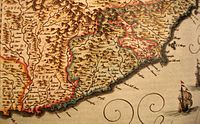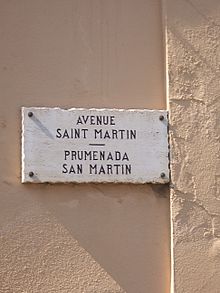- Monégasque dialect
-
Monégasque Munegascu Spoken in Monaco Native speakers 35,657 (2006) (date missing) Language family Indo-European- Romance
- Western
- Gallo-Iberian
- Gallo-Romance
- Gallo-Italic
- Ligurian
- Monégasque
- Ligurian
- Gallo-Italic
- Gallo-Romance
- Gallo-Iberian
- Western
Language codes ISO 639-3 lij Linguasphere 51-AAA-cha This page contains IPA phonetic symbols in Unicode. Without proper rendering support, you may see question marks, boxes, or other symbols instead of Unicode characters. Monégasque (natively Munegascu) is a dialect of the modern Ligurian language, spoken in Monaco.
Contents
Language family
Forming a part of the Western Romance dialect continuum, Monégasque shares many features with the variety of Ligurian spoken in Genoa, but differs from its neighboring dialects Intemelio and Mentonasc. It has been partially influenced by Niçard Occitan. Contemporary Niçard Occitan is also traditionally spoken in some parts of Monaco, besides Monégasque.
Monegasque, along with all Ligurian languages, is derived directly from the Italian of the Middle Ages[citation needed] along with some influences in vocabulary, grammar and syntax from French and related Gallo-Romance languages.
Before the annexation of the County of Nice to France in 1860, the Nizzardo Italians spoke a dialect very similar to the Monégasque.[1]
Speakers
It is spoken in addition to French by the Monégasques. Because the Monégasques are only a minority in Monaco, Monégasque was threatened with extinction in the 1970s.
However, the language is now being taught in schools, and its continuance is regarded as secured. In the old part of Monaco, the street signs are marked with Monégasque in addition to French.
Relation to Italian
Standard Italian - related to Monégasque - is also a major language in Monaco. Italian nationals make up some 20% of the 35,000 permanent residents of Monaco.
Italian was the official language of Monaco when it was a Protectorate of the Kingdom of Sardinia from 1814 to 1861,[2] leaving a legacy in some Monégasque words.
 Monaco -with Menton- was the extreme western area of the Republic of Genoa (green color) in 1664
Monaco -with Menton- was the extreme western area of the Republic of Genoa (green color) in 1664
Indeed, for a long time after the Renaissance, Monaco was the most westerly part on the Mediterranean coast of the Republic of Genoa.
During the fascist occupation in 1942-1943, the Principality of Monaco was incorporated into Italy and Monégasque was said to be an Italian dialect.
After World War II there were nearly 10,000 Italians in Monte Carlo, and some of them (descendants of the Nizzardo Italians - followers of Giuseppe Garibaldi - who were forced to move from Nice to the Kingdom of Italy after 1861) even spoke Monégasque fluently.
Orthography
Monégasque orthography generally follows Italian principles, with the following exceptions:
- the ü is pronounced as in German, or as the French u.
- the œ is pronounced as the French é, and not like the French œu as in bœuf, which is how œ is pronounced in Ligurian, which also uses the character ö to represent this sound.
- the ç is pronounced as in the French ç [s]: tradiçiùn comes from the Latin traditionem , and not from the Italian tradizione.
Samples
Below is an excerpt from the Monégasque national anthem, written by Louis Notari. In addition, there exists an older French version of the anthem whose lyrics bear different meaning. The choice between the two forms is generally subject to occasion and circumstance.
Despoei tugiù sciü d'u nostru paise
Se ride au ventu, u meme pavayùn
Despoei tugiù a curù russa e gianca
E stà l'emblema, d'a nostra libertà
Grandi e i piciui, l'an sempre respetàFollowing is a Monégasque rendering of the Hail Mary prayer:
Ave Maria,
Tüta de graçia
u Signù è cun tü
si benedëta tra tüt'ë done
e Gesü u to Fiyu è benejiu.
Santa Maria, maire de Diu,
prega per nùi, pecatùi
aùra e à l'ura d'a nostra morte
AMEN. (Che sice cusci.)See also
- European languages
- Italian dialects
- Languages of Italy
- Languages of Monaco
- Nizzardo Italians
References
- ^ Beyond Boundaries: Language and Identity in Contemporary Europe, Chapter Seven
- ^ History of Monaco
- ^ Pater Noster in Monégasque
Romance languages Western and Italo-Dalmatian Western Gallo-Italic LigurianOthersGallo-Rhaetian Burgundian · Champenois · Franc-Comtois · French (Standard · African · Canadian · Old French · Middle French · Judaeo-French · French-based creoles) · Gallo · Lorrain · Norman · Picard · Poitevin · Saintongeais · WalloonRhaeto-RomanceOthersOccitano-
RomanceAuvergnat · Gascon (Aranese) · Languedocien · Limousin · Provençal (Niçard · Mentonasc) · Vivaro-Alpine · Old Provençal · Judaeo-ProvençalIbero-Romance Astur-LeonesePortuguese (European · Brazilian · African · Asian & Oceanian) · Galician (Eonavian) · Fala · Judaeo-Portuguese · Portuguese Calão · Portuguese-based creolesAfrican (Equatoguinean) · American · Asian · Peninsular · Old Spanish · Judaeo-Spanish · Spanish Caló · Spanish-based creolesPyreneanItalo-Dalmatian OthersEastern and Sardinian Eastern OthersSardinian —Italics indicate extinct languages; bold indicates languages with more than 5 million speakers; languages between parentheses are varieties of the language on their left.Categories:- Language articles with undated speaker data
- Ligurian language (Romance)
- Languages of Monaco
- Monegasque culture
- Romance
Wikimedia Foundation. 2010.

